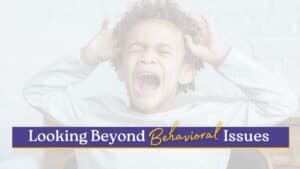
Looking Beyond Behavioral Issues
Behavioral issues can be incredibly consuming and overwhelming, to say the least! In working with families, I always remind parents that they are not alone in facing these difficulties. These
November 19, 2025

Disrespect is at the root of inappropriate behavior. Two of your kids are fighting, another one won’t pick up his toys, and your teenager just revealed the tattoo she got […]
Estimated reading time: 3 minutes
Disrespect is at the root of inappropriate behavior.
Two of your kids are fighting, another one won’t pick up his toys, and your teenager just revealed the tattoo she got without your permission. You’re exhausted, and all you want is peace.
You’re not alone.
For many, disciplining children is a daily challenge. When it comes to discipline in my home, I only have one rule: respect.
Disrespect is the primary root of disobedience. Looking through Scripture, Adam and Eve sinned because they did not respect God’s command. Cain killed Abel because he did not respect his brother’s life. Lying, stealing, vandalism, strife and disobedience stem from an attitude of disrespect toward someone or something.
When your toddler pulls the dog’s tail or your teenager rolls her eyes, it’s — you guessed it — disrespect.
When correcting your child, point out how actions or words were disrespectful, and then ask him to think about something he could have done or said that would have been more polite. In this way, you’re not only correcting inappropriate behavior, you’re also providing opportunities for your child to learn and practice valuable life skills.
Whatever form of discipline you choose, administer it with respect. Your child will learn nothing if you lose your cool. If you want him to be respectful, then you’ll have to model respect. Take note of your tone of voice at all times, especially when your child is acting up. Talk to him as a valued individual, not as a hardened criminal.
When my kids were younger, they often heard me say, “You don’t have to agree with me or like me right now, but you will be respectful.”
They know I’ll accept nothing less from them, and they know that I will show them respect. When a situation is about others, my response is, “Our family treats people (or animals or possessions) with respect.”
By using “we” language, you let your child know your correction isn’t just about him and one infraction. Living respectfully is about holding to a standard that is good for everyone. You don’t have to memorize a long list of rules. You don’t have to sort through every incident to figure out which rule was broken so that you can decide what to do about it. By making respect your one non-negotiable standard, you lighten the load.
Emphasizing respect and honoring people are biblical concepts. Believers are told to respect the law (Proverbs 13:13), honor parents (Deuteronomy 5:16) and live lives worthy of respect (1 Thessalonians 4:11-12). With respect woven throughout Scripture, it’s no wonder that it makes for a strong foundation for family and offers meaningful reward.
When I set a standard of respect in my home, the reward was relationship. My children became people I liked to have around. They trusted me as someone who respected and believed in them. Peace reigned and communication flowed between us.
But I didn’t do this alone. God has been my guide and my support. His wisdom and strength carried me through the times when I felt too weary to press forward. His grace made up the difference when I fell short. And ultimately, He was my inspiration for my standard of respect.